How To Seal A Granite Countertop
August 05, 2019
Nothing adds character and style to a kitchen or home more than a granite countertop. Whether it’s a spacious and inviting island between next to your stove or a grounding force underneath your cabinets, the striking quality of natural stone can enhance the look and feel of a room tenfold. Naturally, with the price tag, quality kitchen counters are an investment for any homeowner, but they are absolutely worth the price and definitely add value.
Considering the investment you’re making in a premium surface countertop, you want to ensure you’re taking all the necessary steps you can to protect it from wear and tear. After all, a majority of granite countertops are in the kitchen where there is a lot of commotion and activity—not to mention possibilities damage. A benefit of granite is that it naturally resists heat, taking most instances of heat impairment off the table—no pun intended; however, staining can occur, whether through spills or the day-to-day hustle and bustle.
While you want a granite countertop that is durable and will withstand the test of time, you also want one you can truly make use of. This is why sealing your granite countertop is absolutely essential, as it allows all parts of it—from the dead center to the countertop edges—to be completely impervious to discoloration and harmful staining. The granite vs. quartz topic is always one worth exploring, but we’re going to specifically focus on granite and how to make the most of it by sealing your countertop properly.
Grab a pen and paper and get ready to take some notes—this how-to will certainly come in handy as you care for your home and kitchen!
Before delving into specifics, you may be wondering: Do all granite countertops need to be sealed? Granite, in general, is very porous and prone to staining, but it’s important to keep in mind that the color and pattern of your granite can actually determine how porous it is. For instance, black granite is so dense it isn’t susceptible to staining, so sealing isn’t always necessary. In order to determine how porous your granite is—which can inform your sealing—you may want to try the water drop test. No, you heard us right—the water drop test!
By placing several droplets of water somewhere on the granite countertop, you can time how long it takes for the water to absorb into the stone. (Some people even take it a step further and pour ½ of a cup on the countertop to see the absorption more clearly.) If the water absorbs immediately, this is a sign that you need to seal your granite once or twice a year and wipe up spills immediately after they happen. If it takes several minutes, this indicates you still want to seal it, but doing so every three years is all that is required. If it takes even longer, like, 10-12 minutes, one layer of sealer may be required. And if the water doesn’t absorb into the granite whatsoever, then sealing isn’t necessary.
It’s important to note that sealing your countertop takes about 20 minutes, so you want to allow enough time to really do the job. After all—you’ve made the investment into this beautiful natural stone and you don’t want to rush the process. First and foremost, you want to remove all belongings from the countertop and wipe it down with a clean rag or cloth. It’s crucial that the surface isn’t wet when you begin the sealing process, so allow some time for it to dry.
Second, you want to wear gloves so you don’t get any of the sealant on your hands. Spraying a relatively thick layer on is encouraged so that you don’t miss a spot—after all, you don’t want one spot staining and another 100% perfect. Leave the sealant on the countertop for about 15 minutes and then wipe off any remaining. Pay close attention to hazy spotting, which can be resolved by spraying some of the sealant on those spots. All in all, you can anticipate for the sealing process to take full effect after 24 hours. It’s important not to place any belongings back on the countertop until then so you can really take note of the granite’s process.
It’s important to keep your countertop clean every year, not just on the occasional time you seal it. When it comes to granite maintenance, using a microfiber cloth to clean the surface is ideal for basic cleaning. When spills and other mishaps occur, wiping down the sealed surface with a cloth and water is all that is really required. Steer clear from abrasive chemicals, as they can damage the stone permanently. However, there are top tier stone cleaners formulated with neutral pH levels that can be used to clean your countertops weekly.
Again, sealing your granite countertops is an important process to ensure you get the most out of this beautiful natural stone since it helps it resist dirt and spills that can ultimately lead to staining and etching. At the end of the day, this preserves the organic beauty of the stone so that it continues to remain a centerpiece and grounding force in your kitchen or home. Additionally, sealing your granite can also mean less time cleaning it since dirt can be easily wiped up without excessive scrubbing. Furthermore, it can prevent you from purchasing unnecessary harmful chemicals to clean it that can eventually damage the stone and your surrounding environment. Clearly, properly sealing your countertops is a 20-minute process that can save you a lot more time and money down the road.
Ordinary usage out of granite countertops, especially in the kitchen, is inevitable, as are spills—particularly on a kitchen island where family and friends congregate over food and drink. At the end of the day, the sealing process ensures you are getting the most out of your granite investment, which also adds value to your home.
Read More about Granite Countertops
5 Gorgeous Black Granite Countertops to Stand the Test of Time
Here's Why the Price of Granite Countertops Can Vary Widely
4 Natural Granite Flooring Finishes for Your Dream Design
5 Dramatic Statement-Making Natural Granite Countertops
READ MORE ABOUT GRANITE COUNTERTOPS
How to Save Money On A Granite Countertop
In Stock And On-Trend Granite Countertops Make A Statement
Installation Tips For Your New Granite Countertop
Is It Worth It to Install Granite Countertops Before Selling My House?


